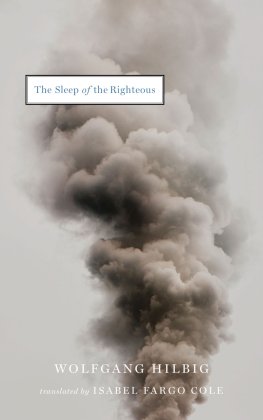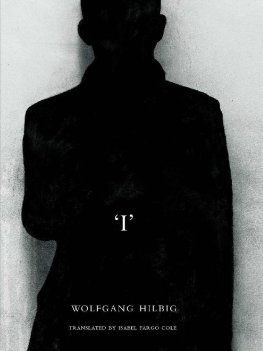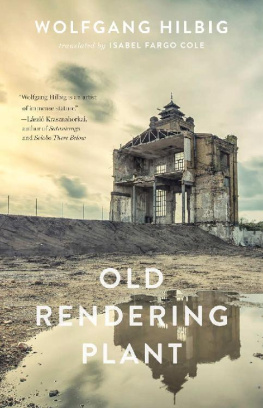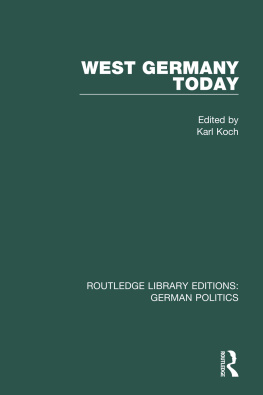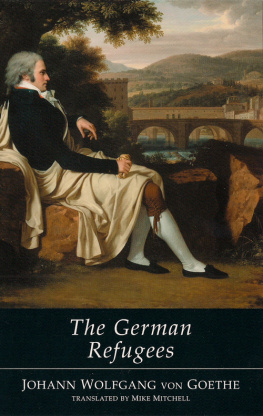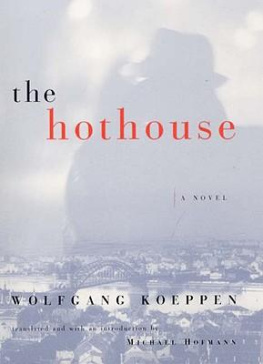Wolfgang Hilbig
The Sleep of the Righteous
Introduction Lszl Krasznahorkai. Translated by Ottilie Mulzet
The world, from the point where Wolfgang Hilbig existed, was bleak and desolate. It is only his sentences wondrously quotable, visionary that give color, light, indeed, in a certain sense, even a kind of magnificence to this bleak and desolate world. But how is this possible? How is it possible to create linguistic magnificence from what is for Hilbig a bleak and desolate world?
Many have already written about Wolfgang Hilbig, but this is worth nothing. Because the secret of Hilbig and there is a secret! remains undisclosed. Hardly anyone knows about him; he remains largely unknown in translation, and even in Germany despite the fact that he should have received every significant literary prize he is practically unknown. Here practically unknown means that the literary public doesnt know about him, the critics dont pay any attention to him, and if it wasnt for the publication of his works by the highly influential publisher S. Fischer Verlag in Frankfurt, and moreover, had there not been, in Hilbigs lifetime, a few really just a few older critics who mentioned his name with appreciation (although no one pays attention to them anymore either), then in all likelihood, at least in the short term, he would completely disappear from our view.
Many have thought and have said about him that because his fate and writerly art are so closely tied with Communist East Germany, Hilbig is just little more than a kind of chronicler of East Germany, a pale Kafkaist and the Germans themselves dont like this kind very much. Hilbigs art, to wit, and with no further prevarications, is built upon the fact that East Germany is identical to the world. To put it more precisely: for Hilbig, East Germany is the world, because what is beyond it does not exist for Hilbig; it could not even exist for Hilbig; for beyond that hideous juxtaposition that was the East German response, within the Soviet bloc, to the Soviet bloc, that is, beyond that particular individual version of the Soviet type of pseudo-Communist dictatorship, nothing, for Hilbig, existed. For him nothing existed; there was no world beyond this! For can there be yet another world beyond the world? he would have asked uncomprehendingly.
Moreover, no German identifies, especially not willingly, with this point of departure, with this frightening identification. The western, northwestern, and southern Germans that is, the free Germans, the Germans who built West Germany during the Cold War generally like to regard the East German Soviet-type dictatorship as a purely political formation, the horrific everyday existence of which they love, even today, to hear and read about voyeuristically: a series of everyday occurrences with all its secrets and disclosures, which was valid exclusively for that East German Germany; which, with its own everyday life, collapsed, disappeared, came to an end. Whoever reads Hilbig quickly understands that nothing ever ends, and there is especially no end for the Germans, because those ordinary days contain within themselves a force: base, frighteningly motionless, dark, lurking in the depths, a monster that has not collapsed, that did not disappear; even today it lurks there in the depths, frightening, threatening, dark, just as if it were always there. People never ask themselves: why did Kleist do away with himself? And in general: why do the Kleists keep doing away with themselves in such a world? No matter how unexpected and perhaps even unfounded a leap of judgment it may appear to be, Hilbig lived those very ordinary events that were part of the everyday lives of Kleist or Bchner or Lenz.
The horrendous, deathly, unquiet, baleful, murderous everyday situations of the petty bourgeois. These routine occurrences do not pass. The petty bourgeois does not pass. A world comes into being through these everyday events, and these are the mundane situations that Hilbig lived through during the decades of the East German pseudo-Communist dictatorship. He did not write about the particular East German pseudo-Communist dictatorship, but about German everyday experiences.
More precisely: about everyday life.
And this is what is so oppressive in Hilbig. With horrific strength, with evocative sorcery, with obsessive precision, he described a world that is distasteful not only to Germans but actually harrowing for all of us who sense the unbroken strength of those ordinary events. He wrote his astounding novels about a world in which only the weak, the sensitive, those incapable of bargaining and in no way heroic, can sense the chaos and the surrealism. Because this world really does have its own rules, and there are those who realize and maintain its organizational structures, since this is their world, a world in which the aggressive, mean-spirited, cowardly, servile namely the rat-person, running away from the monumental, the far-reaching, escaping from freedom is the lord, pursuing at his pleasure those who are alien in his world, which he creates again and again; the alien, those who dont belong there, whose existence cannot be legitimated indeed, the unfortunates who cannot legitimize themselves.
Wolfgang Hilbig is an artist of immense stature. He discovered a wondrous language to describe a horrific world. I admit this is a sick illumination. Nonetheless, it is illumination. Unforgettable.

1
We could claim but a small part of the street: our street, as we called it, stretched townward to the point where the pavement began uneven and jolting, made of square granite cobbles and out the other way to the railroad crossing, where the town, at least its inhabited part, really had already ended. The sedate, brassy clanging when the red and white gates were cranked down a sour note made by a tiny hammer striking the inside wall of a shallow, bowl-like mold was, in a way, the towns death knell, for past the railroad crossing, at least on the right side, lay vast fields of rubble with looming black beams and ruined walls: the remains of munitions factories where concentration camp inmates had labored in wartime.
Our part of the street had not been paved yet, except for the narrow sidewalks outside the two rows of apartment blocks. Between the sidewalks was but a straight track of sand, perhaps once light, now since times unknown black-gray, as though in proof that a mix of many colors ultimately yields darkness. Coal dust and ash had blackened it to the pith, and then had come the reddish mass of crushed brick, the rubble from bombed-out houses that was used to even the surface. After each rain you gazed into a bed of murky, viscous mud; in the dry spells of summer the street was an endless reservoir of dust that advanced all the way into the stairwells and seemed to glow in the midday sun; it covered barefoot boys skin up to the thighs with the black bloom of inviolability.
We little kids, bored in the long days of summer, sat on the curb, our feet in the dust of the gutter, puffing on cigarettes, their smoke barely visible in the suns glare between the faades. And we sat on the steps outside front doors that were always shut against the dust; from a distance we seemed a visibly degenerate mob unlikely to lift its siege of the sidewalk without a fight. Passers-by crossed the street when they saw us, or turned onto a side street beforehand, seeking the shelter of the large trees, the chestnuts or the lindens; our street lacked trees and saw hardly a shadow.
At that time there was a dearth of men in town; most of the children were fatherless, and many remained so forever. Time refused to pass, bearing down on them like a weight that stunted their growth. And the sole liberation from boredom lay in growth, in the adulthood that all the others had achieved some incalculable time ago and no longer wasted a word on. And the books we read, the stories we made up and told, as a rule featured only adults, and for the most part only men. The mere thought that you were still

